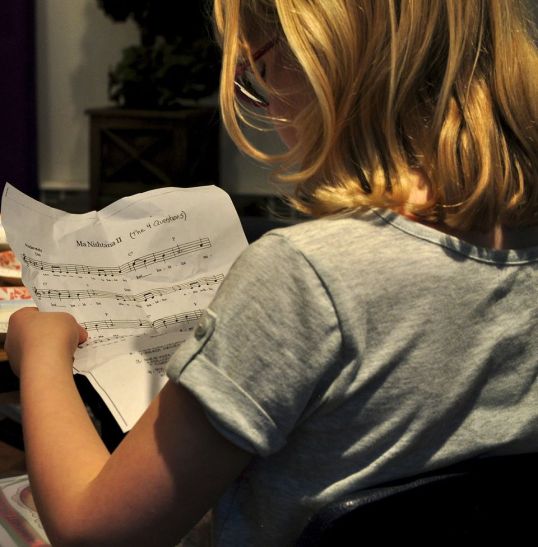
My daughter, reading the Four Questions at a community Passover seder at my Humanistic Jewish synagogue.
I am a Humanistic Jew.
Not everyone knows what that means. When asked what kind of Jew I am, people generally expect me to say I’m Reform or Conservative. My answer is less common, and according to some, more controversial.
I am a Humanistic Jew. In a nutshell, this means that I identify culturally as being a part of the Jewish people, and that I am proud to be a part of Jewish history. I am also an agnostic, so I do not have Jewish religious beliefs.
Here’s how the Society for Humanistic Judaism describes it:

So why do I feel the need to come out as a Humanistic Jew? Well, not all Jews (or Gentiles) see this as a legitimate identity — and, frankly, I personally am someone who worries too much about what others think of me. When I belonged briefly to a Reform synagogue, I didn’t hesitate to answer the question, “What synagogue do you belong to?” In fact, it made me feel like part of the “club” to have a conventional answer. Unfortunately, belonging to that “club” made me feel like a hypocrite because of my lack of religious beliefs. I felt like I was being disrespectful to the religious people in the congregation.

The Humanorah, a symbol of Humanistic Judaism
So, happily, I found a new “club” when my family and I joined Or Emet, the local Humanistic Jewish congregation. It feels wonderful to have a warm, inviting place where I can unapologetically be who I am, a Humanistic Jew. But I still feel nervous about telling some people about Or Emet. Recently, when I was chatting with a Jewish woman by the pool during our daughters’ swim lessons, she told me that she belongs to a Conservative synagogue and sends her daughter to a Jewish day school. She asked me if we belonged to a synagogue. I felt nervous sharing this information with someone who was obviously more traditional than me, but since this particular stranger had just spent half an hour oversharing juicy information about her ex-husband with me, I figured what the heck? Happily, she didn’t seem phased.
Others, however, are not okay with the concept that Judaism can be seen as an ethnicity and culture separate from religious beliefs. For some people, this is because they are religious Jews. For others, regardless of their beliefs, it’s about a genuine fear that we’re all going to become assimilated and forget about who we are. There are only about 14 million Jews worldwide, and in case you’ve been paying attention to history, you know there’s been some effort made to both assimilate us into Christianity and to annihilate us. Many Jews are alarmed by a recent Pew Research Study of Jewish Americans that shows that 62 percent of Jews define Judasim is being primarily about ancestry and culture, and that almost a third of millennial generation Jews define themselves as Jewish and secular.
I can understand the fear of Jews dying out. I fear this too. But I see Humanistic Judaism (and other alternative movements, like Reconstructionist Judaism) as part of the answer. Humanistic Judaism is one possible space where that third of millennial Jews can go to be Jewish and still be secular. Both Reform and Conservative Judaism evolved to meet the changing needs of American Jews who had immigrated from the Old World. Humanistic Judaism can fill in a similar need, while still promoting Jewish identity.
Some may wonder why it’s so important to me to retain my Jewish identity if I don’t have Jewish religious beliefs. Part of it is that like many humans, I feel a powerful connection to my ancestry and history. Religion is not a mandatory part of that type of connection. After all, would you tell an African-American that she couldn’t be African-American unless she was Christian? Of course not. Christianity has been an integral part of the African-American experience, but it’s by no means the only part, and someone isn’t “fired” from being black if she professes agnosticism. I feel the same way about being Jewish.
Like many Jews, the connection I feel to my heritage was reinforced when I travelled to Israel as a young adult. I was sitting on a bus on the way to Jerusalem and felt overcome by emotion. I though about the many generations of Jews who have ended their Passover seders with the words, “Next year in Jerusalem.” For years, this was an unrealizable dream, and yet here I was. When I arrived at the Wailing Wall, I did what many Jews do: I wrote a prayer on a piece of paper and inserted it into the cracks of the wall. One of my best friends, who is Jewish, was about to have her first child, so I wrote a prayer for her and her baby. Despite my agnosticism, I am getting choked up just writing about this moment. This was a moment in my life when I felt deeply in touch with my place in the human experience.
And that’s the thing about Humanistic Judaism that probably has the most meaning to me — it’s about feeling proud and connected to my place in the beautiful, tragic, and complex story of humanity as a Jew. On my trip to Israel, I visited the Diaspora Museum, a museum that documents the detailed story of the Jews throughout history. After spending hours in the exhibits tracing Jews throughout the world, I finally came across the exhibit about American Jews. There was a U.S. map with push pins, and a sign explaining that each push pin was inserted into an American community with a significant Jewish population. My first thought was that the Minneapolis-St. Paul area probably didn’t have a large enough Jewish population to warrant a push pin. But then I looked, and I was wrong. And there was another moment when I felt deeply connected with my place in human history, in Jewish human history. There I was! There was my push pin!
Of course, one part of my understanding of myself in the human Jewish story is the Holocaust. Like many other American Jews, my great-grandmother was murdered by the Nazis. In fact, there’s a photo of Bessarabian Jews in a Nazi ghetto on Wikipedia, and I actually think the woman on the left hand side might be my great-grandmother. Even if she’s not, my place in history is now digitized. My daughter has started asking me questions about the Holocaust, and it’s painful to answer these questions, but I always tell her, “This is one reason why we can never forget we’re Jews.”
And when I tell my daughter about the Holocaust and its place in our Jewish human history, I want her to remember not just victimization but also heroes. Like Boris. My father doesn’t talk about his childhood as a first-generation American Jew very much, but after we saw Schindler’s List, he told me about his father’s friend Boris. After Boris escaped from a concentration camp, he spent the rest of the war running back into Nazi territory and smuggling out children. Later in his life, Boris suffered from tremendous anxiety attacks and hid under tables, and my grandfather was the only one who could coax him back to reality. Boris was a hero. And so was Liviu Lebrescu, a Holocaust survivor and a Romanian Jew who was born not too far from where my grandparents were born. Lebrescu was a professor at Virginia Tech and was in his classroom the day in 2007 (on Holocaust Remembrance Day) when a deranged student started slaughtering people with a machine gun. Professor Lebrescu died as he barricaded the door with his body, and all but one of his students escaped through the window. These stories of Jewish heroism fill me with pride, as does the tradition of the Jewish labor organizer and the many Jewish politicians who have fought for social justice, like Paul Wellstone.
I know that for many Jews, this sense of connection comes from going to a temple and participating traditional prayers. My own experiences do not exclude this. A few weeks ago,my great-uncle Morrie died and I attended services for him at a Reform temple. Most of the people in the sanctuary were older, probably in their eighties at least. The rabbi told a humorous anecdote about Morrie’s poker games and about how the expectation back then was that the wife would offer the poker group a big tray of food around 11:00 pm. There was a very old couple sitting in front of us, and when the rabbi told this story they beamed at each other spontaneously. I felt honored to witness this brief, loving moment in the life of these old strangers. And I felt connected. I understand that the experiences of the Jews in that sanctuary have probably been very different than mine, and I felt honored to be in the sanctuary with them, sharing their traditions.
So there you have it. I am a Humanistic Jew. I hope that no one will read this and think that I disapprove of Jews who are more traditional and who have religious beliefs. That is not the case, just as I don’t disapprove of religious people who are not Jewish. I only hope that traditional Jews will share the same feeling of inclusion about me. For many years I felt lost in the Jewish community, eager to find a way to connect, but feeling shut out because the only way I could see in was through beliefs I didn’t share. I hope that traditional Jews who read this don’t reject me as an outsider, and that they will see something of themselves in my stories of feeling connected to the human Jewish story.





